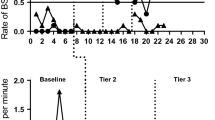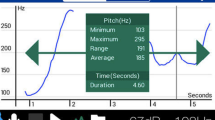Abstract
The school-based consultation literature includes a variety of empirically supported procedures for increasing teachers’ implementation of classroom management strategies. However, teachers may respond differently to empirically supported consultation procedures. This study used a multiple baseline design across three elementary teachers to test the effects of a tactile prompting and weekly performance feedback consultation procedure for increasing teachers’ behavior-specific praise. Additionally, this study included data for teachers’ rate of reprimands and their classrooms’ appropriately engaged behavior and disruptive behavior. Results indicated that tactile prompting and weekly performance feedback increased behavior-specific praise for all three teachers. However, a functional relation between tactile prompting and weekly performance feedback and changes in teachers’ reprimands and their classrooms’ appropriately engaged and disruptive behavior was not established. Implications for applied practice, and limitations and directions for future research are discussed.


Similar content being viewed by others
References
Beaman, R., & Wheldall, K. (2000). Teachers’ use of approval and disapproval in the classroom. Educational Psychology, 20, 431–446.
Blaze, J., Olmi, D., Mercer, S., Dufrene, B., & Tingstrom, D. (2014). Loud versus quiet praise: A direct behavioral comparison in secondary classrooms. Journal of School Psychology, 52, 349–360.
Chalk, K., & Bizo, L. A. (2004). Specific praise improves on-task behavior and numeracy enjoyment: A study of year four pupils engaged in the numeracy hour. Educational Psychology in Practice, 20, 335–351.
Codding, R. S., Feinburg, A. B., Dunn, E. K., & Pace, G. M. (2005). Effects of immediate performance feedback on implementation of behavior support plans. Journal of Applied Behavior Analysis, 38, 205–219.
Codding, R. S., Livanis, A., Pace, G. M., & Vaca, L. (2008). Using performance feedback to improve treatment integrity of classwide behavior plans: An investigation of observer reactivity. Journal of Applied Behavior Analysis, 41, 417–422.
Cooper, J. O., Heron, T. E., & Heward, W. L. (2007). Applied behavior analysis (2nd ed.). Upper Saddle River, NY: Pearson Prentice.
Dufrene, B. A., Lestremau, L., & Zoder-Martell, K. (2014). Direct behavioral consultation: Effects on teachers’ praise and student disruptive behavior. Psychology in the Schools, 51, 567–580.
Dufrene, B. A., Parker, K. M., Menousek, K., Zhou, Qi, Lestremau Harpole, L., & Olmi, D. J. (2012). Direct behavioral consultation in Head Start to improve teacher use of praise and effective instruction delivery. Journal of Educational and Psychological Consultation, 22, 159–186.
Elliott, S. N., & Von Brock Treuting, M. (1991). The Behavior Intervention Rating Scale: Development and validation of a pretreatment acceptability and effectiveness measure. Journal of School Psychology, 29, 43–51.
Evertson, C. M., & Weinstein, C. S. (2006). Classroom management as a field of inquiry. Handbook of Classroom Management: Research, Practice, and Contemporary Issues, 3, 16.
Haydon, T., Conroy, M., Sindelar, P., Scott, T. M., Barber, S. B., & Orlando, A. M. (2010). Comparison of three types of opportunities to respond on student academic and social behaviors. Journal of Emotional and Behavioral Disorders, 18, 27–40.
Horner, R. H., Carr, E. G., Halle, J., McGee, G., Odom, S., & Wolery, M. (2005). The use of single-subject research to identify evidence-based practice in special education. Exceptional Children, 71, 165–179.
Jenkins, L. N., Floress, M. T., & Reinke, W. (2015). Rates and types of teacher praise: A review and future directions. Psychology in the Schools, 52, 463–476.
Kratochwill, T. R., Hitchcock, J. H., Horner, R. H., Levin, J. R., Odom, S. L., Rindskopf, D. M., et al. (2012). Single-case intervention research design standards. Remedial and Special Education, 34, 26–38.
Matheson, A. S., & Shriver, M. D. (2005). Training teachers to give effective commands: Effects on student compliance and academic behaviors. School Psychology, 34, 202–219.
McAllister, L. W., Stachowiak, J. G., Baer, D. M., & Conderman, L. (1969). The application of operant conditioning techniques in a secondary school classroom. Journal of Applied Behavior Analysis, 2, 277–285.
McIntosh, K., Campbell, A. L., Carter, D. R., & Zumbo, B. D. (2009). Concurrent validity of office discipline referrals and cut points used in schoolwide positive behavior support. Behavioral Disorders, 34, 100–113.
Myers, D. M., Simonsen, B., & Sugai, G. (2011). Increasing teachers’ use of praise with a response-to-intervention approach. Education and Treatment of Children, 34, 35–59.
National Technical Assistance Center on Positive Behavioral Interventions and Supports (2016). “What is Tier 1 Support (Primary Prevention)?” Retrieved December 31, 2016 from https://www.pbis.org/school/tier1supports.
Noell, G. H. (2008). Research examining the relationships among consultation process, treatment integrity, and outcomes. In W. P. Erchul & S. M. Sheridan (Eds.), Handbook of research in school consultation: Empirical foundations for the field (pp. 323–342). Mahwah, NJ: Lawrence Erlbaum Associates Inc.
Noell, G. H., Witt, J. C., Slider, N. J., Connell, J. E., Gatti, S. L., Williams, K. L., et al. (2005). Treatment implementation following behavioral consultation in schools: A comparison of three follow-up strategies. School Psychology Review, 34, 87–106.
Reinke, W. M., Lewis-Palmer, T., & Martin, E. (2007). The effect of visual performance feedback on teacher use of behavior-specific praise. Behavior Modification, 31, 247–263.
Reinke, W. M., Lewis-Palmer, T., & Merrell, K. (2008). The classroom check-up: A classwide teacher consultation model for increasing praise and decreasing disruptive behavior. School Psychology Review, 37, 315.
Riley, J. L., McKevitt, B. C., Shriver, M. D., & Allen, K. D. (2011). Increasing on-task behavior using teacher attention delivered on a fixed-time schedule. Journal of Behavioral Education, 20, 149–162.
Rock, M. L., Gregg, M., Thead, B. K., Acker, S. E., Gable, R. A., & Zigmond, N. P. (2009). Can you hear me now? Evaluation of an online wireless technology to provide real-time feedback to special education teachers-in-training. Teacher Education and Special Education, 32(1), 64–82.
Simonsen, B., MacSuga-Gage, A. S., Briere, D. E., Freeman, J., Myers, D., Scott, T. M., et al. (2014). Multitiered support framework for teachers’ classroom-management practices: Overview and case study of building the triangle for teachers. Journal of Positive Behavior Interventions, 16, 179–190.
Solomon, B. G., Klein, S. A., & Politylo, B. C. (2012). The effect of performance feedback on teachers’ treatment integrity: A meta-analysis of the single-case literature. School Psychology Review, 41, 160–175.
Sterling-Turner, H. E., Watson, T. S., Wildmon, M., Watkins, C., & Little, E. (2001). Investigating the relationship between training type and treatment integrity. School Psychology Quarterly, 16, 56.
Stormont, M., Covington, S., & Lewis, T. J. (2006). Using data to inform systems: Assessing teacher implementation of key features of program-wide positive behavioral support in Head Start classrooms. Beyond Behavior, 15, 10–14.
Stormont, M. A., Smith, S. C., & Lewis, T. J. (2007). Teacher implementation of precorrection and praise statements in Head Start classrooms as a component of a program-wide system of positive behavior support. Journal of Behavioral Education, 16, 280–290.
Sugai, G., & Horner, R. R. (2006). A promising approach for expanding and sustaining school-wide positive behavior support. School Psychology Review, 35, 245.
Sugai, G., Lewis-Palmer, T., Todd, A. & Horner, R. (2005). School-wide Evaluation Tool (version 2.1). Educational and Community Supports, University of Oregon.
Watson, T. S., & Sterling-Turner, H. (2008). Best practices in direct behavioral consultation. In A. Thomas & J. Grimes (Eds.), Best practices in school psychology (5th ed., pp. 1661–1672). Bethesda, MD: National Association of School Psychologists.
Author information
Authors and Affiliations
Corresponding author
Ethics declarations
Conflict of interest
The authors declare that they have no conflict of interest.
Informed Consent
Informed consent was obtained from all individual participants included in the study.
Rights and permissions
About this article
Cite this article
O’Handley, R.D., Dufrene, B.A. & Whipple, H. Tactile Prompting and Weekly Performance Feedback for Increasing Teachers’ Behavior-Specific Praise. J Behav Educ 27, 324–342 (2018). https://doi.org/10.1007/s10864-017-9283-6
Published:
Issue Date:
DOI: https://doi.org/10.1007/s10864-017-9283-6




